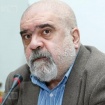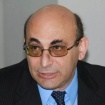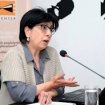Possibilities and Understanding of the Karabakh Conflict Resolution 25 Years after the Ceasefire : Page 8 of 10
are dealing with a different state, in the end. But the process is underway. It is stretched in time, the first dissents appeared immediately after the revolution, and it would have been strange if they did not. This is not a new thing, there have always beendissents between the Karabakh elites and the elites of the Republic of Armenia, starting with times of the first President. Until a new mode is found, we will observe what are witnessing now. Then the dissents will again go "under the covers." However, this has almost nothing to do with the resolution of the conflict. Well, maybe besides the fact that in Azerbaijan they are closely watching all these developments, cherishing a hope for a serious internal Armenian failure. However, I think that is in vain, since this construct (of the Armenian-Karabakh relations) has a very serious margin of safety.
Grazvydas Jasutis - I very closely follow the political landscape in Azerbaijan, which is rather static and stagnant. We thoroughly discussed the impact of the changes in Armenia on the conflict. What do you think about any changes in the political elite in Azerbaijan? Should we talk about post-Aliyev Azerbaijan and a new policy for the resolution of the conflict?
Sergey Markedonov - It seems to me that in the event of a hypothetical change of power in Azerbaijan, there will be no drastic changes in relation to Karabakh! Yes, a more open regime may be established, the pressure on human rights defenders will decrease. But as for Karabakh, it is unlikely that even Aliyev’s harshest critics will express themselves very differently from him. And some may be even tougher in their evaluations. This can be confirmed by the evidence available in the social networks and blogs, total darkness! Therefore, a general political dynamism instead of “stagnation” does not yet mean dynamism in the peace process. In this case inertia is stronger. After all, we are talking about identity, national solidarity. These concepts matter much more than being for or against Aliyev.
Arif Yunusov –When we speak about the situation, we proceed from the existing political landscape, paying attention to those who are spotlighted by the press. However, the option of a social explosion is quite likely, too, as a result of which new leaders will come to power. And here we come to the main point: there is no need to harbor illusions about serious breakthroughs in the Karabakh issue in the event of a change of power. In a quarter of a century, the positions of the parties to the conflict can be said to have been clearly formed and today there is a “red line” which no one will risk to cross, at least today. Pashinyan's example testifies to this. Moreover, the new government will most probably try first to raise the bar in the negotiation process (just like whatPashinyanis openly doing at the moment), then begin the negotiation process from a more convenient platform. However, it is also probable that radical forces will come to power, and everything is possible in this
Pages
- « first
- ‹ previous
- 1
- 2
- 3
- 4
- 5
- 6
- 7
- 8
- 9
- 10
- հաջորդ էջ ›
- նախորդ էջ »







 +37410 563363
+37410 563363
 Բուզանդի 1/3, հարկ 8, Երևան
Բուզանդի 1/3, հարկ 8, Երևան